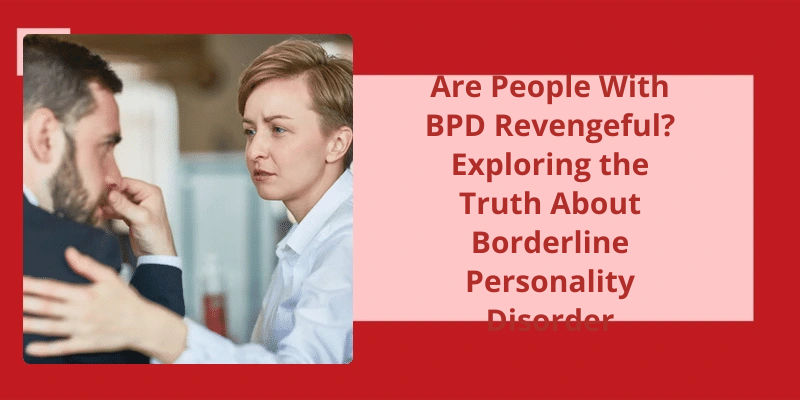On one hand, they desperately crave intense and meaningful connections with those around them, but on the other hand, their tendency towards impulsive behavior, extreme emotions, and perceived abandonment can cause them to lash out and inflict harm on those they love. However, it's essential to understand that the root of these behaviors isn’t malice but a deep-seated emotional pain that these individuals are unable to effectively process or manage. Therefore, it's vital to approach these individuals with empathy and a willingness to educate oneself about their unique struggles.
Do Borderlines Seek Revenge?
On one hand, individuals with BPD may experience feelings of abandonment and rejection that can lead to feelings of intense anger and a desire for revenge. This can manifest itself through actions such as outbursts of rage, violent behaviors, and even threats or acts of revenge. In many cases, these actions are an attempt to regain control or to punish those who’ve hurt them in some way.
Ultimately, the question of whether or not borderlines seek revenge is a complicated one that doesn’t have a simple answer. While the disorder can certainly manifest itself in ways that involve punishment and retaliation, it’s important to remember that each individual with BPD is unique and may experience the disorder differently. It’s important to approach individuals with the disorder with empathy and compassion, and to seek professional help if you or a loved one is struggling with BPD.
It’s important to challenge common misconceptions about mental health conditions. In the case of borderline personality disorder (BPD), one such myth is that individuals with this diagnosis are purposefully trying to cause harm to those around them. This couldn’t be further from the truth, and it’s crucial to debunk this harmful stereotype.
Are People With BPD Malicious?
Although individuals with borderline personality disorder (BPD) can display challenging and unpredictable behavior, they aren’t necessarily malicious. This perception is a common misconception that’s often perpetuated by media portrayals of BPD. In reality, people with BPD are often struggling with intense emotions and are attempting to manage their feelings in the only ways they know how.
It’s important to understand that BPD is a complex mental health condition that can be extremely challenging to live with. This can manifest in behavior that’s distressing to both the individual with BPD and their loved ones, but it isn’t meant to be malicious.
This behavior isn’t intended to manipulate or hurt others, but rather to alleviate their own emotional pain. It’s crucial to approach these individuals with compassion and understanding, rather than judgement or condemnation.
It’s also important to recognize that BPD is a treatable condition. By understanding and addressing the underlying causes of their behavior, individuals with BPD can experience significant improvement in their quality of life.
They’re individuals who’re struggling with a complex and often debilitating mental health condition. By dispelling myths and educating ourselves about BPD, we can work towards creating a more compassionate and understanding society for individuals with this condition.
Symptoms and Diagnosis of BPD
BPD, or borderline personality disorder, is a mental health condition that can be difficult to diagnose due to it’s subtle and complex symptoms. Common symptoms include intense mood swings, impulsive behavior, unstable self-image, and fear of abandonment. A diagnosis is usually made by a mental health professional after a thorough evaluation, including a review of symptoms, medical history, and psychological testing. It’s important to seek professional help if you or a loved one are experiencing these symptoms.
It’s important to note, however, that not all individuals with BPD will become abusers. Every person and situation is unique, and it’s essential to approach each individual experiencing this disorder with empathy, understanding, and specialized care.
Do People With BPD Become Abusers?
It’s important to note that not all people with BPD become abusers. BPD is a complex mental illness that manifests in different ways for different individuals. While some people with BPD may turn to abusive or controlling behavior, others may struggle with self-harm or suicidal thoughts.
This may be because individuals with BPD often struggle with regulating their emotions, leading to intense and unpredictable mood swings. Additionally, their fear of abandonment and feelings of worthlessness can cause them to lash out in harmful ways when they feel threatened.
It’s also important to recognize that people with BPD may have experienced traumatic events in their past that contribute to their behavior. For example, if a person with BPD has a history of abuse or neglect, they may have learned that the only way to protect themselves is to be controlling or aggressive towards others. Trauma can greatly influence a persons behavior and it’s important to approach the situation with empathy and understanding.
Even if a person with BPD does engage in abusive behavior, it doesn’t mean they can’t change. With the right treatment and support, individuals with BPD can learn skills to manage their emotions and improve their relationships. It’s crucial for loved ones to seek out resources such as therapy or support groups to learn how to effectively communicate with someone with BPD and provide a safe and supportive environment.
What Are Some Treatment Options for Individuals With BPD Who Engage in Abusive Behavior?
Borderline Personality Disorder (BPD) is a mental health condition that can cause individuals to engage in abusive behavior towards themselves or others. Some treatment options for individuals with BPD who engage in abusive behavior include therapy, medication, and skills training. Therapy can help individuals identify and manage their emotions and behaviors, while medication can alleviate symptoms such as anxiety or depression. Skills training can teach individuals healthier ways of coping with difficult emotions and improving communication with others.
Source: Are all borderlines abusive?..
It’s important to understand that individuals with Borderline Personality Disorder (BPD) may exhibit behaviors such as lying, deception, and manipulation. However, it’s crucial to recognize that these behaviors aren’t intentional character flaws but rather common symptoms of the illness. People with BPD often struggle to meet their needs in healthy ways, leading to these problematic behaviors. Let’s take a closer look at how BPD can impact communication and relationships.
Are People With BPD Deceptive?
Individuals with BPD often feel intense emotions that are difficult to manage. They may feel overwhelmed, anxious, or angry and struggle to regulate their emotional responses. They may lie or deceive in order to avoid perceived rejection or abandonment, or to get their needs met. However, this doesn’t mean they’re intentionally being manipulative or deceitful.
While lying, deception, and manipulation are common in individuals with BPD, it’s important to recognize that these behaviors can also be present in individuals without the disorder. It’s important to not generalize or make assumptions about someones behavior simply based on their diagnosis. It’s important to recognize that every individual is different and may exhibit different symptoms or behaviors.
That being said, individuals with BPD may struggle with issues surrounding trust. They may struggle to trust others due to a fear of abandonment or rejection.
However, it’s important to recognize that these behaviors are symptoms of an illness rather than character flaws.
The Impact of BPD on Personal Relationships
Borderline Personality Disorder (BPD) is a mental health condition that can greatly impact personal relationships. It’s characterized by intense emotions, unstable self-image, impulsive behavior, and difficulty in forming and maintaining stable relationships. People with BPD often struggle with fear of abandonment, jealousy, and mood swings, which can lead to conflicts in their relationships. This can have negative effects on the person with BPD as well as their loved ones. It’s important for individuals with BPD to seek treatment to manage their symptoms and improve their relationships.
Conclusion
On one hand, they’re constantly in fear of abandonment and rejection, leading them to desperately cling onto their partners. On the other hand, their intense emotions often lead to explosive reactions and perceived slights can lead to a desire for revenge and retribution. However, it’s important to recognize that these behaviors aren’t intentional or malicious, but rather a result of deep-seated trauma and emotional dysregulation. It’s crucial to approach individuals with BPD with empathy and understanding rather than judgment and labeling them as "revengeful." Only then can we break the stigma around BPD and create a more compassionate and inclusive society.






